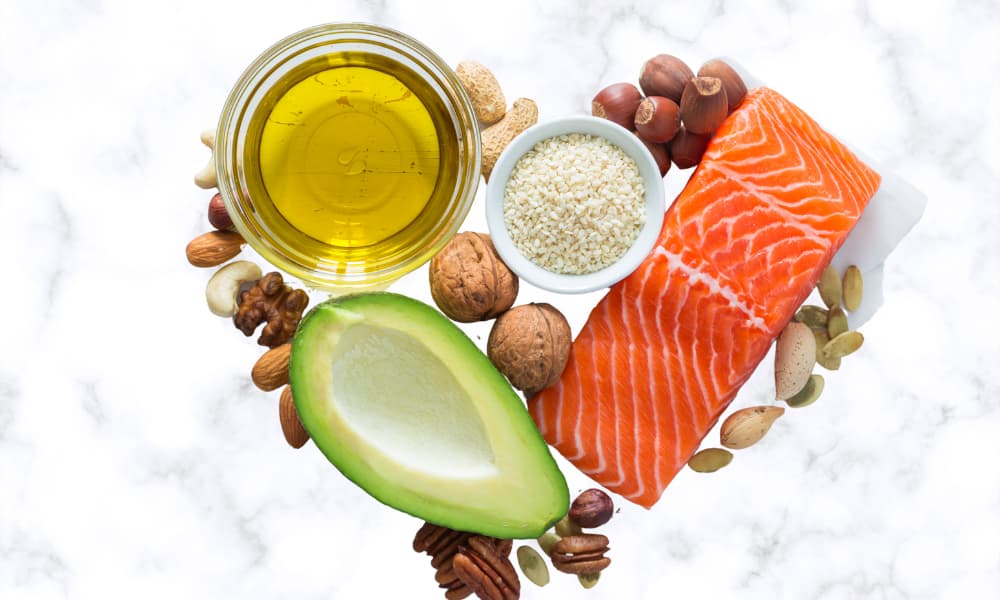
Categories
Why Have I Been Advised to Eat More Fat?
Let’s put it out there from the start: eating fat does not make you fat!
Not all fats are created equal. Yes, some fats can negatively impact your health, particularly hydrogenated and trans fats. However, ‘good’ fats, essential fatty acids (EFAs), have many health benefits. These fats can help treat depression and inflammatory conditions (such as joint problems, eczema, hay fever, and arthritis) and improve brain and nervous system health.
Essential Fatty Acids
- Reducing Body Fat
EFAs can help reduce body fat by:
- Activating a gene that promotes fat usage for energy (increased metabolism).
- Enhancing satiety after meals, reducing overall food intake.
- Stabilising insulin and blood sugar levels leads to less fat storage and fewer cravings for sweet foods.
Low-fat products often contain high amounts of sugar and are heavily processed. Instead, focus on incorporating healthy fats into your diet.
Good Fats (Essential Fatty Acids)
- Omega-3 Fatty Acids
Found in fatty fish (such as salmon, mackerel, and sardines), flaxseeds, chia seeds, and walnuts.
Omega-3 fatty acids are known for their anti-inflammatory properties, making them beneficial for heart health, reducing the risk of chronic diseases, and supporting mental health by potentially alleviating symptoms of depression and anxiety.
- Omega-6 Fatty Acids
Found in nuts, seeds, and plant oils (such as sunflower, safflower, and corn oil).
Omega-6 fatty acids help stimulate skin and hair growth, maintain bone health, regulate metabolism, and maintain the reproductive system. However, to avoid inflammation, it’s important to maintain a proper balance between omega-6 and omega-3 intake.
- Omega-9 Fatty Acids
Found in olive oil, avocados, and nuts.
Omega-9 fatty acids support heart health by reducing the risk of cardiovascular diseases, improving cholesterol levels, and promoting healthy inflammatory responses.
- Monounsaturated Fats
Found in olive oil, avocados, and many nuts and seeds.
Monounsaturated fats are known to reduce harmful cholesterol levels in your blood, which can lower the risk of heart disease and stroke. They also provide nutrients to help develop and maintain your body’s cells.
- Polyunsaturated Fats
Found in sunflower oil, soybean oil, and many types of nuts and seeds.
These fats are essential for brain function and cell growth. They also include omega-3 and omega-6 fats, which are necessary for your body and can help reduce the risk of heart disease.
Five Essential Fats You Should Have in Your Kitchen
- Butter
Great for cooking and richer in nutrients than processed spreads. It also tastes better and supports overall health.
- Coconut Oil
It is highly versatile and excellent for cooking. Boosts metabolism and provides additional health benefits.
- Olive Oil
It is ideal for cold dishes like salads, but avoid cooking with it as high heat can turn it rancid.
- Animal Fats
Residual fats from meat can be used for stocks and baking. Organ meats provide a broader range of nutrients (try it you might like it)
- Cod Liver Oil
Rich in omega-3 fatty acids, it is crucial for heart and brain health. It is particularly beneficial in some instances, although not for everyone.
Changing Perceptions
The media and processed food manufacturers have long misrepresented fats. However, consuming the right kinds of fats in sufficient quantities is essential for optimal health. Fats play a critical role in every bodily function, and understanding their importance is vital to getting healthier and leaner.
We help our members with a nutritional programme that works for them. If you’re struggling, give us a shout at one of our personal training gyms in London, and we’ll help you work out a plan that suits you.
You may also find our nutritional e-books helpful to eating healthier.
Related Articles
- A Different Take on Fat Loss
- Meal Prep for Fat Loss
- What Makes a Diet Successful? A Different Approach to Food
- Five Fats You Should Have In Your Kitchen
- The Role of Carbohydrates, Fats, and Proteins in Fuelling the Aerobic Energy System


